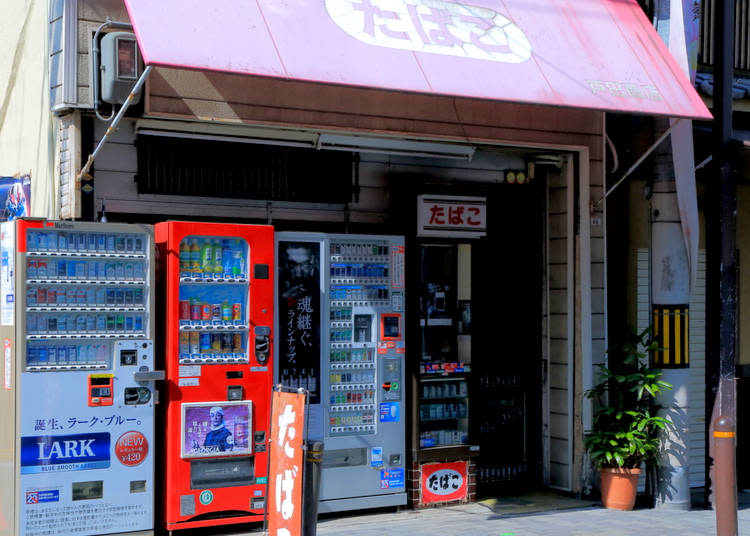Japan's Smoking Laws: Coping with Tourism - A Nation Still Living in the Past?

The smoking laws in Japan a take on a rather unique shape. Said laws are often unclear; smoking is acceptable in many establishments, yet often outlawed on pedestrian walkways, permitted on one side of a cafe partition, yet forbidden on the other. To some these laws seem a little laissez-faire, to others they seem kind of confusing, and for most visitors they are wholly different from the regulations within their own country.
We wanted to find out what foreigners in Japan thought about the country's smoking regulations and how, if at all, it affects people's experiences here – especially in the lead up to the 2020 Tokyo Olympics. We asked resident expats, foreign visitors and a prominent anti-tobacco advocate to share their thoughts on the matter. Here's what we found.
1. Smoking in Public Places: How big of an issue is it in Japan?

Image credit: Jacky221 / Shutterstock.com
Professor and leading anti-tobacco advocate, Christopher Rathbone, has referred to Japan as a "tobacco friendly country" on several occasions. When the smoking regulation data is compared with that of other countries, the statement seems to ring true. But how do people on the ground feel about the issue?
The general consensus seems to be that smoke-friendly areas and restaurants in Japan are easily avoidable, but in more traditional izakayas and independent coffee shops, you're more likely to encounter people smoking.
Cian, a visitor from Ireland who came to Japan last year, told me that he felt it wasn't such an issue, especially because he was only here for two weeks. "I didn't really mind because I was on holiday. I think if I lived there all the time, it would probably annoy me more." Though he followed this up by admitting that "eating food in smoky restaurants was actually kind of a nice novelty."
On the other side of the coin, an issue for the smokers, is that there aren't enough places to find somewhere to legally have a cigarette. A tobacco-loving friend of mine shared that, "In Tokyo anyway, unless you're in an establishment that permits smoking, you sometimes have to walk seemingly forever to find somewhere to light up. The designated areas are often small, claustrophobic rooms inside shopping malls, and are not that easy to find."
2. Designated Smoking Areas: Are they Effective?

Christopher Rathbone refers to the Japan Tobacco (JT) Strategy of promoting "good smoking manners," which he fears is designed to make smoking more socially acceptable and to maintain the current number of smokers in the country. One of the ways in which these "good manners" manifest themselves is through the implementation of designated smoking areas all across the nation. So how do these smoking areas shape up in reality?
Paul, a long-time Tokyo resident from Canada told me, "Often in cafes and restaurants, the smoking/non-smoking boundary is arbitrary, not separated by much more than an open-air partition." This he feels renders the whole smoke-free section "pointless." He adds, "Sometimes I'd like to go out for a cheap meal, but unless I go to a few specific places, I know that I'll probably be in close proximity to second-hand smoke."
Bill, a year-long resident in Yokohama, felt it was less of an issue. "Obviously I'd rather not have people smoke around my food. But to be honest most of the restaurants in Tokyo, even smaller ones, not just the big chains, have great ventilation. So generally you don't really notice it. It only ever frustrated me in older, cramped places where everyone is smoking. But it's part of the culture I guess, so I just accepted it."

Smoking areas outside of restaurants are not as prevalent, but they do exist. Japanese people will usually only smoke in designated smoking zones (though sometimes you will see smokers getting their nicotine fix in side alleys and quiet backstreets instead).
Tourists on the other hand, tend to be a bit more laissez-faire in their adherence towards Japan's policy of smoking in designated areas only.
Each prefecture has its own ordinances regarding this, but there are certain places that are typically more smoke-friendly than others. It's also worth noting that several areas also have posted fines for smoking.
・Street-level: In most major cities and bigger towns smoking of any kind is completely forbidden on public walkways, but it may not be as strictly enforced in less populated areas of the country.
・Shinkansen: Many of the major lines will have small smoking rooms between carriages.
・Major train stations: Often there will be a designated smoking room in large stations; local ones may no longer have a smoking space.
・Indoors (shopping malls, office complexes, department stores etc): Often a designated smoking room exists, particularly if the building has many floors.
3. How Have Laws and Policies Changed Over the Years?

Image credit: 4kclips / Shutterstock.com
Most people would claim that regardless of where you go in Japan, the smoking restrictions have tightened, particularly over the last 20 years. Though Christopher Rathbone would caveat that sentiment with, "Currently, there is an amendment bill to add a public smoking ban to the Health Promotion Act. However, the bill is facing stiff opposition and commentators have expressed some surprise at the unwillingness of Japan's national legislators to pass a comprehensive public indoor smoking ban."
A law came into place last year completely outlawing smoking in schools, hospitals and government offices nationwide. A law that many foreigners feel should be a given. A "watered-down" version of the law was applied to smaller existing eateries however. Restaurants with less than 1,076 square meters of customer space are still at liberty to permit smoking, whereas in larger or newly opened restaurants smokers will be consigned to smoking in ad hoc smoking rooms.
One Tokyoite, a long-time resident of the cosmopolitan Ebisu district, says that, "In many places around Ebisu, indoor smoking has been replaced in favor of vaping or iQOS electronic cigarettes (which produce significantly less second-hand smoke). It's not perfect yet but for [those concerned with] second-hand smoke, it seems to be a move in the right direction."

Image credit: TK Kurikawa / Shutterstock.com
Cigarettes are still cheap in Japan due to low taxation (although the price is steadily increasing), but many convenience stores no longer sell tobacco or nicotine in any form. Ironically, tobacco vending machines are still relatively prevalent, but in order to purchase from these you would need to acquire a Taspo card. These smartcards are available for residents only and they are not available to those under the legal smoking age of 20.
The laws around tobacco advertising also saw a shift. Japan became a signatory to the World Health Organization’s Framework Convention on Tobacco Control, which came into effect in 2005. Tobacco advertising was replaced with smoking manners campaigns, accompanied by a slew of hilarious posters stating warnings like, "Don't smoke in a crowd, coats are expensive." Christopher Rathbone and other anti-tobacco advocates have questioned the validity of these posters, however, especially given that they bear the logo of JT, Japan's leading tobacco manufacturer.
In any case, recent news has shown that the Japanese government is set to almost entirely eradicate indoor smoking in the capital before the 2020 Olympics in Tokyo. The law which states that smoking is prohibited in any bars or restaurants with hired employees, will take effect on July 24, 2020 – the date the 2020 Summer Olympics get underway.
4. Japan's Smoking Policy: Comparison with Other Countries?

Image credit: MoreGallery / Shutterstock.com
When my brother, a smoker, visited Japan both in 2015 (Hokkaido) and in 2018 (Tokyo) he loved that he rarely had to leave his dinner table to light up a cigarette. "I wish there were more places like this back home (UK)," was a statement uttered at most meals.
The UK, the US and Canada have (more or less) blanket bans on indoor smoking in public buildings, and have had for quite some time. The smoking outside laws are a little fuzzier, so most smokers take to the streets for their post-meal nicotine hit. My brother also observed that "Japan's laws feel like an inverted version of those in the UK."
Much of the rest of Asia is still lagging behind the western world in this respect, although not in all cases. Christopher Rathbone notes that "Japan is part of the shrinking world of tobacco friendly countries which include India, Indonesia and China. Most significantly, Japan's policy on passive smoking lags far behind South Korea which brought a comprehensive smoking ban into force on January 1, 2015."
My own experience of living of living in China in 2015/2016 aligns with this statement. It appeared as though a majority of men smoked and you could buy a pack of cigarettes for as cheap as around 100RMB (¥158). A situation that has scarcely changed since.
In spite of the EU's pretty comprehensive indoor smoking bans, around 26% of the population are regular smokers, which is painfully evident in certain countries. One 19-year-old French woman noted to me that "everyone my age smokes in Paris," before adding that "as long as you are outside of a public building there are no laws against it, which probably isn't a great way to prevent more people from getting addicted."
5. Bottom line: How Much Do the Smoking Laws in Japan Actually Affect Your Experience There?

So, what is the upshot of all of this? Japan's smoking laws do seem a little more archaic than much of the rest of the so-called developed world, but how much does this actually affect people's experiences.
-If you are a smoker:
The consensus is that it's great if you want to be able to have a smoke at your table while you're out for dinner or drinks. Many of the cheap izakayas and bars are smoke-friendly, or else have smoking seats available.
Though there are smokers who complain about the lack of facilities available at street-level. The major cities have become less smoke-friendly and look to be continuously moving in that direction. Many have ordinances prohibiting smoking while walking, and have designated smoking areas.
-If you are a non-smoker:
The non-smoker consensus is that yes, it can be annoying, but for the most part it’s pretty avoidable if you want it to be. While certain eateries are often smoke-friendly, many sushi, ramen and boutique restaurants have prohibited all tobacco use (and vaping) indoors. And with pretty stringent smoking on the street laws (and the chance of perpetrators receiving a hefty fine), seeing people smoking in heavily populated public areas like Tokyo, Osaka, and Kyoto is becoming ever rarer.
And if second-hand smoke indoors is something that you're concerned about then you can the ask the staff before taking your seat in a restaurant: "Zen seki wa kinen desu ka?" ("Are all seats non-smoking?"). Otherwise you may be rather unexpectedly guzzling down an earthy plume of smoke along with your noodles and sake.
Here are some final tips from Japanese residents, if you want to avoid passive smoking while in Japan:
Paul (Tokyo resident from Canada): "Look out for restaurants or bars with English outside. They are often more used to catering towards foreign clientele, so they are more likely to be smoke-free or at least have no-smoking tables".
Tom (Tokyo resident from the UK): "Try going to izakayas that look a little newer, or less traditional. I find that it's mostly older restaurants that allow smoking inside. Alternatively, more expensive places and touristy restaurants are usually smoke-free."
Written by:

David McElhinney
David is a Northern Irish freelance writer and English teacher living in Tokyo. He loves living in Japan, reading about Japan, writing about Japan and eating Japanese food. He also spends a lot of time exercising, playing rugby and risking a litany of muscle-related injuries in yoga class.


